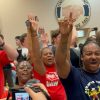By David Commissiong
Not only do we now have a CARICOM Reparations Commission representing 15 national governments and nation-states of the Caribbean, but we have also witnessed the recent establishment of such important Black civil-society institutions as the National African-American Reparations Commission and the European Commission For Reparations, and we are aware that similar Brazilian, Canadian and continental African initiatives are currently in various stages of preparation.
Furthermore, these important developments have taken place against the background of the commencement, on 1st January 2015, of the United Nations International Decade For People of African Descent– a specially designated ten year period during which the critical issues facing people of African descent are to take center-stage and to engage the full attention of the international community.
In light of these historic happenings, there can be no better time than the present for conscious Black, African or African-descended brothers and sisters to get on board the Reparations Movement!
I therefore wish to encourage and foster such a development by outlining what I consider to be the ten fundamental principles of Reparations (or of the Reparations Movement), and by also dispensing practical advice as to how an interested brother or sister who has joined together with other like-minded persons to establish a local, community-based Reparations organization can use such an organization to actualize these fundamental principles.
1. VALIDATION OF OUR HUMANITY
The first and most basic principle of the Reparations Movement is that the very demand for Reparations constitutes– in itself– an indispensable validation by us of our own precious humanity!
You see, if we fail to demand that the present-day representatives and beneficiaries of those persons, institutions and nations that committed the most horrible crimes imaginable against our ancestors be held accountable and made to pay restitution, we would be implicitly sending a message to ourselves and to the world at large that we do not consider our ancestors (or ourselves) to be sacred beings imbued with inalienable rights and deserving of respect and justice!
And so, the mere act of demanding Reparations is important, and is a critical component of the process, that we must engage in as individuals and as a collective, of repairing ourselves!
But clearly, any such validation of our humanity will have to begin with a knowledge of who we were as a people BEFORE the criminal European impositions of slavery and colonialism. Thus, the first and most basic activity of the local, community-based Reparations organization must be “study”: the members of the Reparations organization should make it a priority to engage in a study of our pre-slavery, pre-colonial African civilization, as well as a study of our history of European (and Arab) orchestrated enslavement and its effects on our civilization.
2. COMPLETION OF THE EMANCIPATION PROCESS
Of course, the point must be made that the racist oppression of black or African people did not end with the formal abolition of slavery! Indeed, after the abolition of slavery n the 19th century our historical oppressors deliberately entrapped our ancestors in economic, political and social arrangements that were designed to handicap them and to serve the interests of the former en-slavers– arrangements that have persisted (in modified form) down to the present day.
The struggle for Reparations must therefore be– among other things– a struggle to expose and put an end to such arrangements and to complete the Emancipation process! This is the second fundamental principle of the Reparations Movement.
It goes without saying therefore that the local community based Reparations organization will be required to make a study of our post-slavery history (with a view to identifying the many ways in which our historical oppressors unlawfully enmeshed and entrapped post-slavery generations), as well as a study of the present-day existence of such debilitating and oppressive arrangements.
But such studies should be seen as necessary preludes to and preparation for action! Indeed, having properly educated and informed itself, the Reparations organization should undertake a continuous campaign of public exposure of such racist present-day arrangements; should advance public demands that they be terminated; and should undertake public protests, boycotts and other forms of individual and collective action to bring about the termination of such still existing racist arrangements.
3. COMPENSATION MUST BE PROPORTIONATE TO THE CRIME
The demand for compensation from the present-day representatives of those who inflicted horrendous crimes on our ancestors and who damaged and disabled succeeding generations must consist of a demand for the transfer of material resources in an amount proportionate to the enormity of the crimes and their deleterious effects— resources to enable us to counter the economic and social imbalances derived from those centuries of criminality.
It will be very important therefore for the members of the Reparations organization to collectively discuss, work out, and document ideas for appropriate Reparations initiatives, payments and programmes that are capable of achieving such an objective.
4. REPARATIONS MUST PRODUCE THE JUST SOCIETY
The fourth fundamental principle of the Reparations Movement is that the campaign for Reparations or for Reparative Justice must be designed to produce the “just society”, in that the demand for Reparations must be formulated as a demand for a fundamental transformation of the currently existing inequitable and exploitative economic and power relations that exist in the international arena and in our domestic societies.
And here again, it will be incumbent on the members of the local, community-based Reparations organization to collectively discuss, work out and document ideas for appropriate payments and programmes that are imbued with the potential to achieve this very ambitious (but critical) goal.
5. WE MUST EXERCISE AUTONOMY THROUGHOUT THE PROCESS
It is extremely important that in the midst of the presentation of our demand for the payment of compensation ( in financial and material resources as well as in developmental programmes) from the present-day representatives and beneficiaries of our historical oppressors, we make it absolutely clear to all and sundry that even though we value the concept of collaboration with our historical debtors in addressing the tragic effects of the crimes of the past, that the strategies and tasks to be implemented for our psychological repair and for our economic and social empowerment are our own responsibility and will be conceptualized, directed and controlled by us!
This is the fifth fundamental principle of Reparations, and the members of the Reparations organization must insist that it be adhered to!
6. WE MUST REPAIR OURSELVES
A critical component of the campaign for Reparations must be our own inwardly directed struggle for psychological, cultural and spiritual self-repair. Thus, the members of the Reparations organization must – as individuals and as a collective – seek to identify all of the ways in which we have been and continue to be negatively affected by false notions of white supremacy and black inferiority, and rigorously attack them and eradicate the negative effects that impact on our psyches!
7. SELF-REPAIR WILL GENERATE MASS SUPPORT FOR REPARATIONS
The effort to “prosecute” and hold accountable the present-day representatives and beneficiaries of our historical oppressors will require the widespread participation of our people: and the attainment of such widespread popular participation will, in turn, be dependent on the inwardly directed struggle for self-repair and its capacity to persuade a critical mass of our people to re-evaluate themselves and their history; to perceive the gravity of the injustice; to feel the tragic historical loss we have suffered; and to be sufficiently motivated to get involved or otherwise support the campaign for Reparations.
The community – based Reparations organization must therefore engage in an outreach programme to the members of our community that is designed not only to educate them about the relevant history, but to also help them to emotionally connect with that history and the tragic loss and injustice suffered.
One of the ways in which the Reparations organization should approach this critical task is to set out to make our historical loss visible and tangible and to accord it national respect, by establishing and commemorating at the highest national level an annual “African Holocaust or Maafa Day“, as well as by creating a major public monument that memorializes our ancestors, their suffering and their heroic martyrdom.
Another relevant strategy would be to develop a Reparations research and public education initiative that takes the form of the periodic staging of a “People’s Tribunal On Reparations” – the setting up of a people’s court in which the national governments and institutions that enslaved our ancestors are publicly put on trial.
8. REPARATIONS MUST BE A BROAD MOVEMENT
The campaign for Reparations must be designed, on the one hand, to bring on board with us all of our natural allies in Africa and the Diaspora, Latin America and Asia and to enlist the tremendous weight of world opinion on our side, and, on the other hand, to isolate and publicly hold up to international embarrassment and ridicule all those entities that perversely and unreasonably seek to deny and resist the manifest justice and righteousness of our claim.
The Reparations organization should therefore set about to bring allies on board by reaching out to and educating organizations and individuals of other ethnic backgrounds about our Reparations cause, particularly those belonging to non-European ethnic groups.
The organization and its members should also systematically set out to publicly confront, embarrass and isolate organizations, public office holders, and even Governmental administrations that deprecate and deny our Reparations claim.
9. OUR PEOPLE MUST BE INTIMATELY INVOLVED
The masses of our people must be intimately involved in the campaign for Reparations: they must be permitted enough time and opportunity to thoroughly discuss and understand the issue; their right to have the final and decisive say on the concrete details of the Reparations claim must be respected; and they must have a say – through representatives specifically selected by them – as to how the compensatory resources are utilized.
The Reparations organization should therefore systematically appeal to and challenge all of the relevant local and national organizations (and their members – particularly their black members) to put support for Reparations on their agenda and to include it in their programmes and Manifestos – political parties, trade unions, youth organizations, churches, women’s organizations, educational institutions, local government administrations, and the list goes on.
There must also be no compromise on the requirement that the “trustees” of any Reparations Fund that emerges out of the Reparations Campaign must include trusted representatives of the people directly selected by the people themselves!
10. NETWORK AND ESTABLISH A NEW INTERNATIONAL LEGAL STRUCTURE
The community based Reparations organization must be linked into both a national network and an international network that are preparing and engaging in legal, diplomatic and political strategies at the national and international levels to achieve Reparations.
And since the Reparations claim that is being advanced on behalf of the sons and daughters of Africa and the Diaspora is of a magnitude and complexity hitherto unknown to the currently existing international court system, it will require the setting up of a special new International Tribunal specifically designed to deal with and do justice to a Reparations claim of this historical importance and magnitude.
The local, community-based Reparations organization must therefore give full and committed support to this critical international component of the Reparations Campaign!
Onwards to the achievement of Reparations in this United Nations International Decade For People of African Descent!
DAVID A. COMISSIONG
President
Clement Payne Movement














